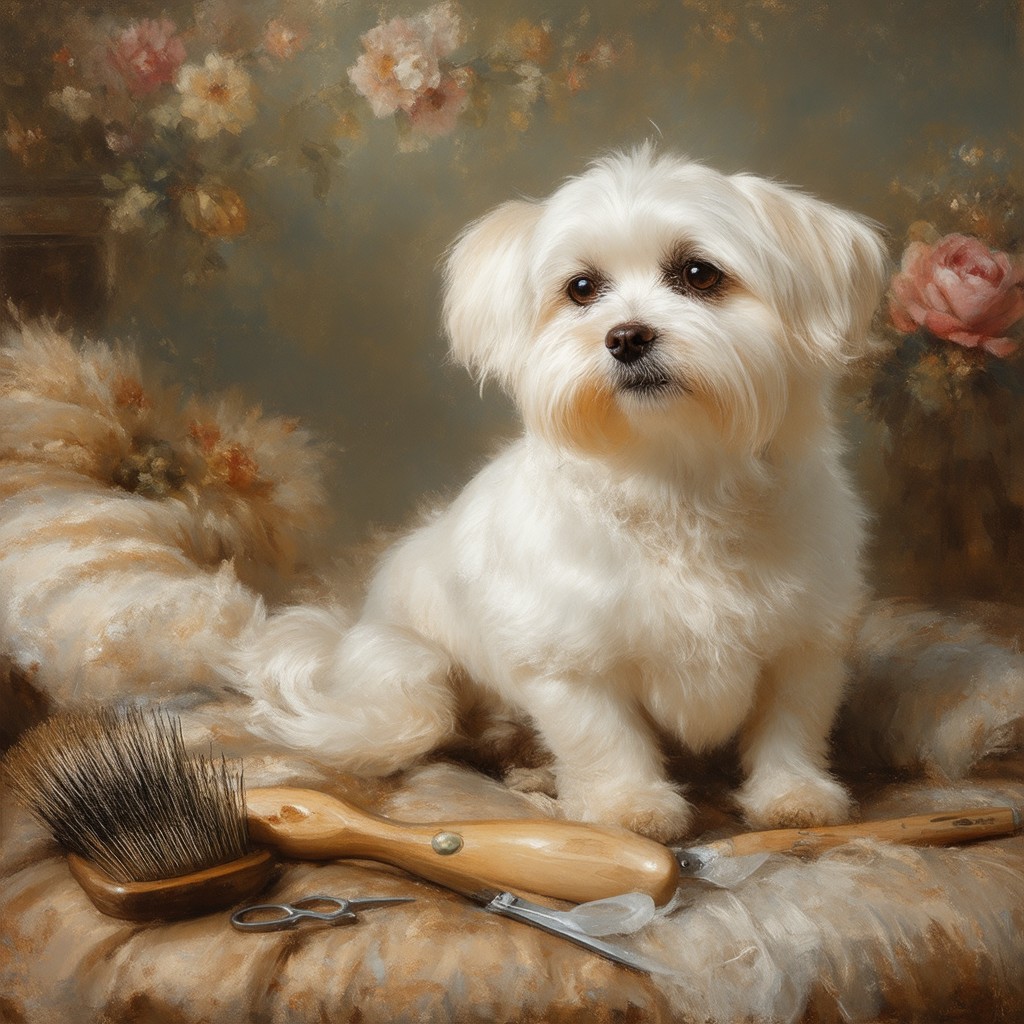Key Takeaways
- Maltese dogs require daily grooming to maintain their long, silky coats and prevent matting.
- This breed is prone to health issues, particularly dental problems and heart disease, making regular veterinary care essential.
- Maltese are affectionate companions that thrive on human interaction, but they may experience separation anxiety if left alone for too long.
- Training Maltese dogs is manageable due to their intelligence, but early socialization and consistent reinforcement are key.
- Understanding the costs associated with owning a Maltese, including grooming and healthcare, can help prospective owners prepare for their needs.
Welcome to our comprehensive guide on the maltese, a breed known for its charming personality and stunning appearance. In this article, we will delve into the essential aspects of owning a maltese dog, including whether they are high maintenance, their care requirements, and their overall lifespan. You will discover the unique characteristics of maltese puppies, essential grooming tips, and the pros and cons of bringing a maltese into your home. Additionally, we will explore the health concerns that may affect their lifespan and provide insights into their behavior and training needs. Whether you’re considering adopting a maltese or are already a proud owner, this article will equip you with valuable knowledge to ensure a happy and healthy life for your furry friend. Let’s embark on this journey to understand the maltese breed and what it takes to care for these adorable dogs from Malta.
Understanding the Maltese Breed
Is Maltese a high maintenance dog?
Maltese dogs are often considered high maintenance due to their specific grooming and health care needs. Here’s a detailed overview:
- Grooming Needs: Maltese require daily brushing to prevent matting and tangles in their long, silky coats. This breed’s hair can easily become knotted, making regular grooming essential. Additionally, they benefit from weekly baths using a gentle dog shampoo to maintain coat cleanliness and health.
- Professional Grooming: Many Maltese owners choose to schedule professional grooming every 4 to 6 weeks. This includes trimming the coat to a manageable length, cleaning the ears to prevent infections, and trimming nails to keep them at a healthy length. Professional groomers can also provide specialized treatments for coat conditioning.
- Dental Care: Regular dental cleaning is crucial for Maltese dogs, as they are prone to dental issues such as periodontal disease. Daily tooth brushing and dental chews can help maintain oral health. According to the American Veterinary Dental College, dental care is vital for preventing serious health issues.
- Coat Care: The Maltese’s beautiful, long, white coat requires consistent care to prevent mats and tangles. Using a high-quality conditioner can help keep the coat soft and manageable. It’s also advisable to use a slicker brush and a comb to effectively detangle the hair.
- Potential Health Issues: Maltese dogs are susceptible to various health problems, including dental issues, respiratory problems, and allergies. Regular veterinary check-ups can help monitor these conditions. The American Kennel Club emphasizes the importance of preventive care in maintaining the overall health of Maltese dogs.
In summary, while Maltese dogs are affectionate and charming companions, they do require a significant commitment to grooming and health care, making them a high maintenance breed.
Overview of Maltese dogs and their characteristics
The Maltese breed is renowned for its charming personality and striking appearance. These small dogs, originally from Malta, are characterized by their long, flowing white coats and playful demeanor. Here are some key characteristics of Maltese dogs:
- Size: Maltese are toy-sized dogs, typically weighing between 4 to 7 pounds, making them ideal for apartment living.
- Temperament: Known for their affectionate nature, Maltese dogs are loyal companions that thrive on human interaction. They are playful and often exhibit a lively spirit.
- Intelligence: Maltese dogs are intelligent and eager to please, which makes them relatively easy to train. They respond well to positive reinforcement techniques.
- Activity Level: While they enjoy playtime and short walks, Maltese dogs do not require extensive exercise, making them suitable for less active owners.
- Health Considerations: As a breed, Maltese are prone to certain health issues, including dental problems and patellar luxation. Regular veterinary care is essential to monitor their health.
Overall, the Maltese breed is an excellent choice for those seeking a loving and devoted companion, provided they are ready to meet the grooming and care requirements associated with these delightful dogs.

Maltese Care and Maintenance
Can a Maltese be left alone all day?
Maltese dogs can generally be left alone for a maximum of five hours, but several important factors should be considered to ensure their well-being. Here are key points to keep in mind:
- Social Nature: Maltese dogs are inherently affectionate and social animals. They thrive on companionship and may suffer from separation anxiety if left alone for extended periods. According to the American Kennel Club, this breed is known for forming strong bonds with their owners, making them prone to distress when isolated.
- Individual Temperament: Each Maltese has a unique personality. Some may adapt better to being alone than others. It’s essential to assess your dog’s specific needs and behavior. Gradual training can help them become more comfortable with short periods of solitude.
- Exercise and Mental Stimulation: Before leaving your Maltese alone, ensure they have had sufficient exercise and mental stimulation. Engaging them in play or a walk can help reduce anxiety and promote relaxation during your absence. The Association of Professional Dog Trainers suggests providing interactive toys to keep them occupied.
- Separation Anxiety Solutions: If your Maltese shows signs of separation anxiety, consider strategies such as crate training, using calming aids, or consulting a professional dog trainer. Resources like the ASPCA offer guidance on managing anxiety in pets.
- Alternatives to Loneliness: If you need to be away for longer than five hours, consider alternatives such as hiring a dog walker, enrolling them in doggy daycare, or asking a friend or family member to check in. This can help alleviate feelings of loneliness and provide necessary social interaction.
In summary, while Maltese dogs can be left alone for short periods, it is crucial to consider their social needs and individual temperament. Providing adequate exercise, mental stimulation, and exploring alternatives to extended solitude can significantly enhance their well-being.
Essential grooming tips for Maltese puppies
Grooming is a vital aspect of Maltese care, especially for Maltese puppies. Here are essential grooming tips to keep your Maltese looking and feeling their best:
- Regular Brushing: Maltese puppies have long, silky coats that can easily tangle. Brush their fur at least three times a week to prevent mats and keep their coat healthy. A slicker brush works well for this breed.
- Bathing: Bathe your Maltese puppy every three to four weeks using a gentle dog shampoo. This helps maintain coat cleanliness and reduces odors. Be sure to rinse thoroughly to avoid skin irritation.
- Ear Care: Check your Maltese’s ears regularly for dirt and wax buildup. Clean them gently with a damp cotton ball or a vet-recommended ear cleaner to prevent infections.
- Nail Trimming: Trim your puppy’s nails every few weeks to prevent overgrowth and discomfort. If you’re unsure how to do this, consult a professional groomer or your veterinarian for guidance.
- Dental Hygiene: Start brushing your Maltese puppy’s teeth early to establish a dental care routine. Use a dog-specific toothpaste and a soft toothbrush to maintain their oral health.
By following these grooming tips, you can ensure that your Maltese puppy remains healthy, comfortable, and looking adorable. Regular grooming not only enhances their appearance but also strengthens the bond between you and your furry friend.
Pros and Cons of Owning a Maltese
When considering adding a Maltese to your family, it’s essential to weigh the pros and cons. This breed, known for its charming personality and affectionate nature, can be a delightful companion. However, potential owners should also be aware of the challenges that come with caring for these small dogs.
What are the pros and cons of a Maltese?
Here’s a closer look at the advantages and disadvantages of owning a Maltese:
Pros:
- Affectionate Companionship: The Maltese is known for its loving and gentle nature, making it an excellent companion for individuals and families alike. They thrive on human interaction and are often described as “lap dogs” due to their desire to be close to their owners.
- Low Shedding: This breed has a long, silky coat that does not shed much, making them a suitable option for allergy sufferers. Regular grooming is essential to maintain their coat and minimize matting.
- Adaptability: Maltese dogs adapt well to various living situations, including apartments and small homes, due to their small size and moderate exercise needs. They enjoy short walks and playtime, making them ideal for urban living.
- Intelligence: Maltese are intelligent and eager to please, which makes them relatively easy to train. Positive reinforcement techniques work best, and they can learn a variety of commands and tricks.
Cons:
- Fragility: Due to their small size, Maltese dogs are delicate and can be easily injured. They are not recommended for households with very young children or overly energetic pets, as they may be unintentionally harmed during play.
- Grooming Needs: The Maltese requires regular grooming to keep their coat in good condition. This includes daily brushing and periodic professional grooming, which can be time-consuming and costly.
- Potential Health Issues: Like many small breeds, Maltese dogs can be prone to certain health problems, including dental issues, patellar luxation, and heart conditions. Regular veterinary check-ups are essential to monitor their health.
- Separation Anxiety: Maltese dogs can develop separation anxiety if left alone for extended periods. They thrive on companionship and may exhibit destructive behaviors if they feel neglected.
Maltese Temperament and Behavior Traits
The temperament of a Maltese is one of its most appealing traits. These dogs are known for their friendly and playful demeanor. They are highly social and enjoy being around people, making them great family pets. Maltese dogs are also known for their loyalty and can form strong bonds with their owners.
However, their affectionate nature can lead to some behavioral challenges. Maltese dogs may bark frequently, especially if they feel threatened or bored. Early socialization and training are crucial to help manage this tendency. Additionally, their small size can sometimes lead to overprotectiveness, as they may see themselves as guardians of their home and family.
In summary, while the Maltese can be a wonderful addition to the right home, potential owners should consider their temperament and behavior traits to ensure a harmonious living environment. For more insights on pet care and training, explore resources from the American Kennel Club or Vetstreet.
Health and Lifespan of Maltese Dogs
Understanding the health and lifespan of Maltese dogs is crucial for any potential owner. These charming maltese companions are known for their affectionate nature, but like all breeds, they come with specific health considerations that can impact their longevity. By being aware of these factors, you can ensure a healthier, happier life for your maltese puppy.
What is the leading cause of death in Maltese?
The leading cause of death in maltese dogs is heart disease, particularly congestive heart failure, which often develops as they age. This condition is primarily attributed to the weakening of heart valves, especially the mitral valve, leading to a decline in heart function. Key factors contributing to heart disease in Maltese include:
- Genetic Predisposition: Maltese are genetically predisposed to certain heart conditions, making regular veterinary check-ups essential for early detection and management.
- Obesity: Excess weight can exacerbate heart issues. Maintaining a healthy diet and regular exercise can help mitigate this risk.
- Age: As Maltese age, the risk of developing heart disease increases significantly. It is crucial to monitor their health closely during their senior years.
- Dental Health: Poor dental hygiene can lead to periodontal disease, which has been linked to heart disease in dogs. Regular dental care is vital for overall health.
- Stress and Anxiety: High-stress levels can negatively impact a dog’s heart health. Providing a calm environment and engaging in positive reinforcement training can help reduce anxiety.
To support heart health in Maltese, pet owners should consider incorporating a balanced diet rich in omega-3 fatty acids, which have been shown to promote cardiovascular health. Regular veterinary check-ups, including heart screenings, are also recommended to catch any potential issues early. For more comprehensive health management, consulting with a veterinarian about wellness coaching tailored for dogs can provide additional strategies for maintaining a Maltese’s overall well-being.
Average lifespan of Maltese dogs and factors affecting it
The average lifespan of maltese dogs typically ranges from 12 to 15 years, although some may live longer with proper care. Several factors can influence the lifespan of a maltese, including:
- Genetics: Just like humans, genetics play a significant role in determining the lifespan of maltese puppies. Responsible breeding practices can help reduce the risk of hereditary health issues.
- Diet and Nutrition: A balanced diet tailored to the specific needs of maltese can enhance their overall health and longevity. Foods rich in essential nutrients support their immune system and prevent obesity.
- Exercise: Regular physical activity is vital for maintaining a healthy weight and preventing health issues. Engaging in daily walks and playtime can significantly contribute to a longer lifespan.
- Veterinary Care: Routine veterinary visits for vaccinations, dental care, and health screenings are essential for early detection of potential health problems, ensuring a longer, healthier life.
By understanding these factors, you can take proactive steps to enhance the lifespan of your maltese dog. Investing in their health today will pay off with many years of companionship and joy.

Maltese Behavior and Training
Do Maltese dogs bark a lot?
Maltese dogs are known for their vocal tendencies, and several factors contribute to their barking behavior:
- Barking Triggers: Maltese dogs often bark when they experience anxiety, excitement, or a protective instinct. They may react to strangers, other dogs, or even stimuli like the television. According to a study published in the Journal of Veterinary Behavior, small breeds, including Maltese, are more prone to vocalization due to their heightened alertness and sensitivity to their environment.
- Protective Instincts: As a toy breed, Maltese dogs have a natural inclination to alert their owners to potential threats. This behavior is rooted in their history as companion animals, where being vigilant was essential for their survival. The American Kennel Club notes that this protective nature can lead to excessive barking if not managed properly.
- Training and Management: Consistent training is crucial in managing excessive barking. Techniques such as positive reinforcement, desensitization, and obedience training can significantly reduce barking tendencies. A study from the Applied Animal Behaviour Science journal emphasizes that early socialization and training can help mitigate barking issues in small breeds.
- Individual Differences: While Maltese dogs are generally vocal, individual barking tendencies can vary widely. Factors such as personality, temperament, and early experiences play a significant role in how much a particular Maltese may bark. Some may be more reserved, while others are naturally more vocal.
- Exercise and Enrichment: Providing adequate physical exercise and mental stimulation is essential for reducing barking. Engaging activities, such as interactive toys and regular walks, can help channel their energy and reduce the likelihood of excessive barking. The Pet Professional Guild suggests that a well-exercised dog is less likely to bark out of boredom or frustration.
In conclusion, while Maltese dogs are known for their barking, understanding the underlying causes and implementing effective training and management strategies can help control this behavior. For further insights on dog training and behavior, resources from the American Kennel Club and the Association of Professional Dog Trainers can be beneficial.
Are Maltese hard to potty train?
Potty training a Maltese can present unique challenges, but with the right approach, it is entirely achievable. Here are some key points to consider:
- Small Bladder Size: Due to their small size, Maltese puppies have smaller bladders, which means they need to relieve themselves more frequently. This can lead to accidents if they are not taken out regularly.
- Consistency is Key: Establishing a consistent routine for potty breaks is crucial. Taking your Maltese outside after meals, playtime, and naps can help reinforce good habits.
- Positive Reinforcement: Using positive reinforcement techniques, such as treats and praise, when your Maltese successfully goes outside can encourage them to repeat the behavior. This method is more effective than punishment, which can lead to anxiety.
- Crate Training: Crate training can be an effective tool for potty training. A crate provides a safe space for your Maltese and encourages them to hold their bladder, as dogs typically avoid soiling their sleeping area.
- Patience and Understanding: Every dog is different, and some Maltese may take longer to potty train than others. Patience and understanding are essential during this process. If accidents occur, it’s important not to scold your dog, as this can create fear and confusion.
In summary, while Maltese dogs may require a bit more effort in potty training due to their size and temperament, a consistent, positive approach can lead to successful outcomes. For more tips on dog training, consider exploring resources from Vetstreet and ASPCA.
Maltese Cost and Pricing
When considering bringing a Maltese into your home, understanding the Maltese cost is essential. The price of a Maltese puppy can vary significantly based on several factors, including the breeder’s reputation, the puppy’s lineage, and geographical location. On average, you can expect to pay between $1,000 and $3,000 for a Maltese puppy from reputable breeders. This price range reflects the quality of care and breeding practices that ensure healthy puppies.
Maltese cost: What to expect when buying a Maltese puppy
When purchasing a Maltese puppy, it’s crucial to consider not just the initial cost but also ongoing expenses. Here are some key factors that influence the overall Maltese cost:
- Breeder Reputation: Puppies from well-known breeders who prioritize health testing and ethical breeding practices may come at a higher price, but this often ensures a healthier dog.
- Location: Prices can vary by region. Urban areas may have higher costs due to demand, while rural areas might offer more competitive pricing.
- Health Clearances: Puppies that come with health clearances for common issues in the breed, such as dental problems or patellar luxation, may be priced higher but can save you money on veterinary bills in the long run.
- Age: Younger puppies typically cost more than older ones. However, consider that older puppies may already have some training, which can be beneficial.
Additionally, consider the long-term costs associated with owning a Maltese, including grooming, food, veterinary care, and training. Regular grooming is essential for maintaining the Maltese’s beautiful coat, which can add to the overall cost of ownership.
Price of Maltese puppies from breeders and factors influencing cost
The price of Maltese puppies from breeders can be influenced by various factors:
- Lineage: Puppies from champion bloodlines or show-quality parents often come with a higher price tag.
- Color and Size: Rare colors or smaller sizes may command higher prices in the market.
- Breeder Practices: Ethical breeders who invest in the health and well-being of their dogs will typically charge more, reflecting their commitment to responsible breeding.
- Market Demand: The popularity of the Maltese breed can affect pricing. As demand increases, so does the price.
For those considering adoption, organizations like Petfinder can provide options for finding Maltese dogs in need of homes, often at a lower cost than purchasing from breeders.
Ultimately, understanding the Maltese cost and the factors influencing it will help you make an informed decision when welcoming a Maltese dog into your family.
Maltese Variants and Crossbreeds
Exploring the Maltese Poodle mix and its characteristics
The Maltese Poodle mix, often referred to as the Maltipoo, is a popular hybrid breed that combines the charming traits of both the Maltese dog and the Poodle. This crossbreed typically inherits the intelligence and hypoallergenic coat of the Poodle, making it an excellent choice for families with allergies. Maltipoos are known for their playful and affectionate nature, often forming strong bonds with their owners.
In terms of appearance, Maltipoos can vary significantly, depending on whether they take after their Maltese or Poodle parent. They usually have a soft, curly coat that requires regular grooming to prevent matting. The temperament of a Maltipoo is generally friendly and sociable, making them great companions for children and other pets. Their adaptability allows them to thrive in various living situations, from apartments to larger homes.
For those considering a Maltipoo, it’s essential to research reputable breeders to ensure the health and well-being of the puppy. The price of a Maltipoo can vary widely, often influenced by the breeder’s reputation and the puppy’s lineage.
Maltese with Shih Tzu: A popular crossbreed option
The Maltese with Shih Tzu mix, commonly known as the Maltese Shih Tzu or Malshi, is another favored crossbreed that combines the best traits of both parent breeds. This mix is celebrated for its adorable appearance and friendly disposition. Malshis typically have a long, flowing coat that can be either straight or wavy, requiring regular grooming to maintain its beauty and prevent tangles.
In terms of temperament, the Maltese Shih Tzu is known for being affectionate, playful, and relatively easygoing. They are excellent companions and tend to get along well with children and other pets. This breed is also known for its loyalty, often forming strong attachments to their families.
When considering a Maltese Shih Tzu, potential owners should be aware of the importance of socialization and training from an early age to ensure a well-rounded pet. The cost of Maltese Shih Tzu puppies can vary, but they are generally priced similarly to other small breed puppies. For more information on Maltese puppies for sale, you can visit [Petfinder](https://www.petfinder.com/) or check out the [Maltese Club of America](https://www.maltese.com/).













